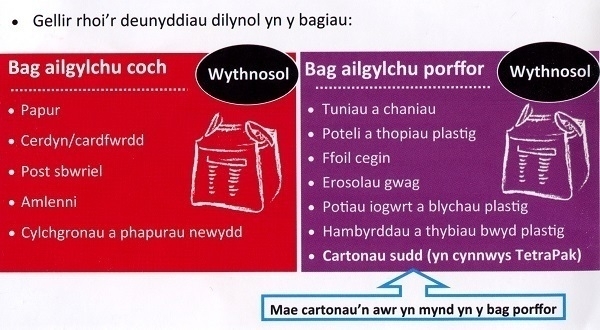Bagiau Ailgylchu

Legislation stipulates that “so far as is appropriate in the circumstances and reasonably practicable […] the Welsh and English languages should be treated equally in the conduct of public business in Wales”. In practice, that will often mean receiving official communications given in both languages. An example is shown above: part of a bilingual leaflet I was sent recently on the subject of what materials can be placed in our new bagiau ailgylchu amldro (reusable recycling bags). The vocabulary shown happens to include several terms taken from, or via English, for example: tuniau a chaniau are tins and cans; potiau iogwrt are yoghurt pots; ffoil is foil; erosolau are aerosols; plastig is plastic.
I’m all in favour of Welsh being treated equally, despite its being a minority language I don’t speak, and even though I live in one of the most Anglicized corners of Wales. Sometimes the insistence on providing translations can verge on the ridiculous, such as when signs point to a lifft / lift (an unvoiced f sound is written as ff in Welsh; while a single f in Welsh would be pronounced like an English v). It’s hard to imagine a monoglot Welsh speaker taking to the stairs because they don’t know what a ‘livt’ is. Half-baked combinations of the two languages are not uncommon: for example a new housing development near me has been called ‘Elderwood Parc’, where parc is simply the Welsh (in which a c is always hard) for park – why not use a Welsh equivalent of ‘Elderwood’ too, or just leave it at ‘park’?